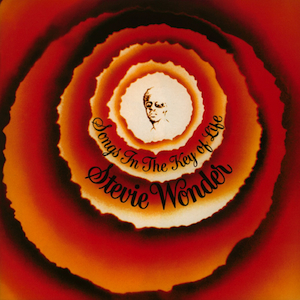
Songs in the Key of Life is the eighteenth studio album by American singer, songwriter and musician Stevie Wonder. A double album, it was released on September 28, 1976, by Tamla Records, a division of Motown. It was recorded primarily at Crystal Sound studio in Hollywood, with some sessions recorded at the Record Plant in Hollywood, the Record Plant in Sausalito, and The Hit Factory in New York City; final mixing was conducted at Crystal Sound. The album has been regarded by music journalists as the culmination of Wonder's "classic period" of recording.

William Frederick Gibbons is an American rock musician, best known as the guitarist and primary vocalist of ZZ Top. He began his career in Moving Sidewalks, who recorded Flash (1969) and opened four dates for the Jimi Hendrix Experience. Gibbons formed ZZ Top in late 1969 and released ZZ Top's First Album in early 1971. He has also maintained a solo career in recent years, starting with his first album Perfectamundo (2015).
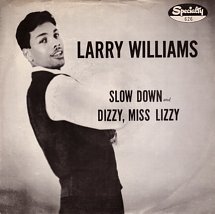
"Slow Down" is a rock and roll song written and performed by Larry Williams. Recorded in 1957, AllMusic writer Stewart Mason describes it as "raucous enough to be punk rock nearly a full two decades before the concept was even in existence." Specialty Records released it as a single in 1958, but only the second-side "Dizzy, Miss Lizzy" reached the record charts. Both songs were later covered by the Beatles.

"I Can't Stop Loving You" is a popular song written and composed by country singer, songwriter, and musician Don Gibson, who first recorded it on December 3, 1957, for RCA Victor Records. It was released in 1958 as the B-side of "Oh, Lonesome Me", becoming a double-sided country hit single. At the time of Gibson's death in 2003, the song had been recorded by more than 700 artists, most notably by Ray Charles, whose recording reached No. 1 on the Billboard chart.

Always & Forever is the second studio album by American country music singer Randy Travis. It was released on May 4, 1987, by Warner Bros. Records. Released from this album were the singles "Too Gone Too Long", "I Won't Need You Anymore ", "Forever and Ever, Amen" and "I Told You So", all of which reached Number One on the Billboard Hot Country Songs charts.

"One of These Nights" is a song written by Don Henley and Glenn Frey and recorded by the American rock band Eagles. The title track from their 1975 One of These Nights album, the song became their second single to top the Billboard Hot 100 chart after "Best of My Love" and also helped propel the album to number one. The single version was shortened from the album version of the song, removing most of the song's intro and most of its fade-out, as well. Henley is lead vocalist on the verses, while Randy Meisner sings high harmony on the refrain. The song features a guitar solo by Don Felder that is "composed of blues-based licks and sustained string bends using an unusually meaty distortion tone."
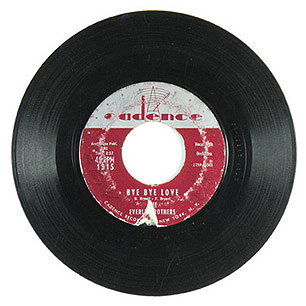
"Bye Bye Love" is a popular song written by Felice and Boudleaux Bryant and published in 1957. It is best known in a debut recording by the Everly Brothers, issued by Cadence Records as catalog number 1315. The song reached No. 2 on the US Billboard Pop charts and No. 1 on the Cash Box Best Selling Record charts. The Everly Brothers' version also enjoyed major success as a country song, reaching No. 1 in the spring of 1957. The Everlys' "Bye Bye Love" is ranked 210th on Rolling Stone magazine's list of "The 500 Greatest Songs of All Time".

"Heartache Tonight" is a song written by Don Henley, Glenn Frey, Bob Seger and J. D. Souther, recorded by the Eagles and features Glenn Frey on lead vocals. The track was included on their album The Long Run and released as a single in 1979. It reached No. 1 on the U.S. Billboard Hot 100 in November of that year and was certified Platinum by the Recording Industry Association of America representing one million copies sold. It was the Eagles' final chart-topping song on the Hot 100.

"Oh Lonesome Me" is a popular song written and recorded in December 1957 by Don Gibson with Chet Atkins producing it for RCA Victor in Nashville. Released in 1958, the song topped the country chart for eight non-consecutive weeks. On what became the Billboard Hot 100, it peaked at No. 7. It was Gibson's only Top 10 hit on the pop chart. Its B-side was "I Can't Stop Loving You", which peaked at No. 7 on the C&W Jockey charts and became a standard song about unrequited love. The vocal backings on both songs were provided by the Jordanaires.

Passing Through is the sixteenth studio album by American country music artist Randy Travis. It was released on November 9, 2004 by Word Records. The album produced two singles on the Billboard country charts: "Four Walls" at #46 and "Angels" at #48. "That Was Us" was previously recorded by Tracy Lawrence on his 2001 album of the same name.

My Melody is the fifth studio album by American singer Deniece Williams, released in March 1981 by ARC/Columbia Records. The album reached No. 13 on the Billboard Top Soul LPs chart. My Melody was certified Gold in the US by the RIAA.
"Take These Chains from My Heart" is a song by Hank Williams. It was written by Fred Rose and Hy Heath and was recorded at Williams' final recording session on September 23, 1952, in Nashville. The song has been widely praised; Williams' biographer Colin Escott deems it "perhaps the best song [Rose] ever presented to Hank...It was one of the very few songs that sounded somewhat similar to a Hank Williams song." Williams is backed by Tommy Jackson (fiddle), Don Helms, Chet Atkins, Jack Shook, and Floyd "Lightnin'" Chance (bass). In the wake of Williams' death on New Year's Day, 1953, the song shot to No. 1, his final chart-topping hit for MGM Records. Like "Your Cheatin' Heart," the song's theme of despair, so vividly articulated by Williams' typically impassioned singing, reinforced the image of Hank as a tortured, mythic figure.
"You Win Again" is a 1952 song by Hank Williams. In style, the song is a blues ballad and deals with the singer's despair with his partner. The song has been widely covered, including versions by Ray Charles, Jerry Lee Lewis, Roy Orbison, the Grateful Dead, Charley Pride, Bob Dylan, and the Rolling Stones.
"Making Believe" is a country music song written by Jimmy Work. Kitty Wells recorded a chart-topping version in 1955. The song is on many lists of all-time greatest country music songs and has been covered by scores of artists over the past fifty years, including Thorleifs, Bob Dylan, Johnny Cash, Don Gibson, Roy Acuff, Lefty Frizzell, Wanda Jackson, Connie Francis, Ray Charles, Anita Carter, Dolly Parton, Emmylou Harris, Merle Haggard, Ernest Tubb, Skeeter Davis, The Haden Triplets, Social Distortion and Volbeat. The song is occasionally called "Makin' Believe".

Cafe Carolina is the fourteenth studio album by American country music artist Don Williams. It was released in May 1984 via MCA Records. The album peaked at number 13 on the Billboard Top Country Albums chart.

Visions is the sixth studio album by American country music singer-songwriter Don Williams. Released on January 17, 1977 on the ABC-Dot label, the album reached number four on the US Country Albums chart. "Some Broken Hearts Never Mend" was released as a single in 1977, reaching number one on the Billboard country singles chart. Visions was the first of two Don Williams albums released in 1977, along with Country Boy, which was released later the same year.

Talk to Your Heart is a studio album by country music artist Ray Price. It was released in 1958 by Columbia Records. AllMusic gave the album four-and-a-half stars. Reviewer George Bedard called it "a great collection" and "a real-life 'Texas-flavored' record by a honky tonk master." On November 17, 1958, it was rated No. 3 on Billboard magazine's "Favorite C&W Albums" based on the magazine's annual poll of country and western disc jockeys.
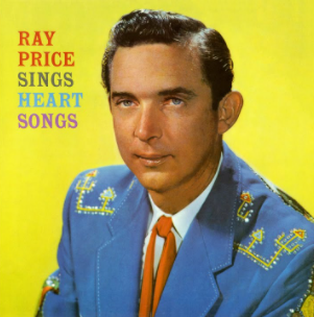
Ray Price Sings Heart Songs is a studio album by country music artist Ray Price. It was released in 1957 by Columbia Records. AllMusic gave the album four-and-a-half stars. In Billboard magazine's annual poll of country and western disc jockeys, it was ranked No. 1 among the "Favorite C&W Albums" of 1957.
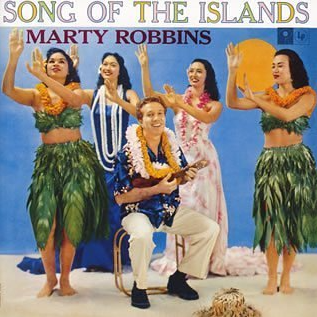
Song of the Islands is a studio album by country music singer Marty Robbins. It was released in 1957 by Columbia Records.
















